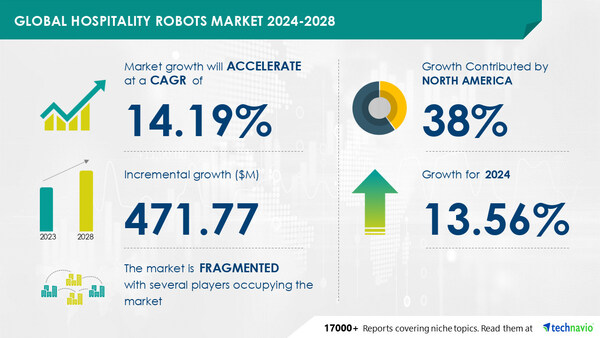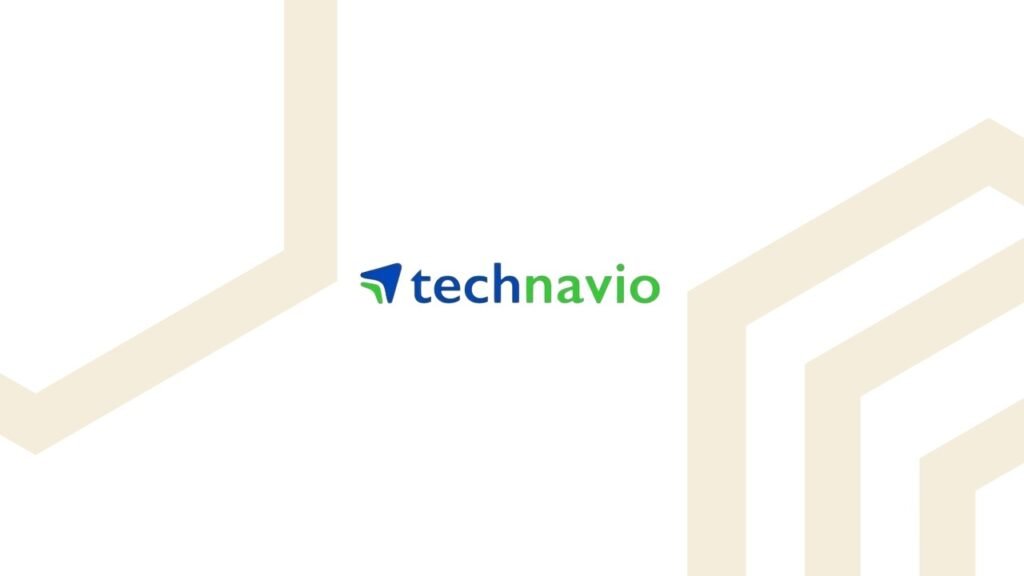NEW YORK, May 17, 2024 /PRNewswire/ — The global hospitality robots market size is estimated to grow by USD 471.77 mn from 2024-2028, according to Technavio. The market is estimated to grow at a CAGR of 14.19% during the forecast period.
For more insights on the forecast market size and historic data (2018 – 2022) – Download Free sample report in minutes

| Forecast period | 2024-2028 |
| Base Year | 2023 |
| Historic Data | 2018 – 2022 |
| Segment Covered | End-user (Hotels, Restaurants and bars, and Travel and tourism industry), Distribution Channel (Online and Offline), and Geography (North America, Europe, APAC, South America, and Middle East and Africa) |
| Region Covered | North America, Europe, APAC, South America, and Middle East and Africa |
| Key companies profiled | Awabot, Bear Robotics Inc., Connected Robotics Inc., Hyundai Motor Co., KNEXT GmbH, Knightscope Inc., Pudu Technology Inc., Pypestream LLC, Quantum Robotics, Relay Robotics Inc., Richtech Robotics Inc., Shanghai Gaussian Automation Technology Development CO. LTD., Shanghai Qinglang Intelligent Technology Co. Ltd., Singapore Technologies Engineering Ltd., sliQue Robotics, SoftBank Robotics Group Corp., Tailos, UBTECH ROBOTICS CORP LTD., and LG Electronics Inc. |
Key Market Trends Fueling Growth
The IoT revolution is transforming the hospitality industry through the integration of robotics. Robots, including mobile guidance systems, cleaning machines, and porter bots, are employed for enhanced customer satisfaction and operational efficiency. Hospitals, hotels, and restaurants are adopting AI and ML-enabled robot assistants for language translation, luggage handling, and security. Innovations such as humanoid robots and AI robot servers are addressing the manpower crunch in the industry. Travelmate Robotics is a notable example of IoT-driven hospitality robotics. These technologies offer utility in sanitization, motion control systems, and wireless communications, leading to significant innovations in the hospitality sector.
Market Challenges
- Hospitality robots, integrated with IoT technology, are revolutionizing the hotel, restaurant, and facilities industries. These robots, available in various sizes and functionalities, range from USD5,000 to USD100,000. Smaller robots, such as porter robots and AI robot servers, cost between USD5,000 and USD20,000. Larger, sophisticated robots, including humanoid robots and multilingual robots, can cost up to USD100,000 or more. Additional costs may include customization, maintenance contracts, and training programs. The hospitality industry benefits from robots through improved customer service, operational efficiency, and reduced manpower requirements. Innovations in robotics, such as AI, ML, and autonomous navigation, continue to shape this market.
Research report provides comprehensive data on impact of trend, driver and challenges – Buy Report
Segment Overview
This hospitality robots market report extensively covers market segmentation by
- End-user
- 1.1 Hotels
- 1.2 Restaurants and bars
- 1.3 Travel and tourism industry
- Distribution Channel
- 2.1 Online
- 2.2 Offline
- Geography
- 3.1 North America
- 3.2 Europe
- 3.3 APAC
- 3.4 South America
- 3.5 Middle East and Africa
1.1 Hotels- The Hospitality Robots Market exhibits significant growth, with the end-user segment led by hotels. IoT integration and the utility of robots in the hospitality industry are driving this trend. Hotels are adopting robots to enhance customer service, operational efficiency, and address manpower crunch. Innovations such as multilingual robots, porter robots, humanoid robots, and AI robot servers are gaining traction. Henn-na Hotel in Nagasaki, Japan, is a notable example, utilizing robots for check-in, concierge, and housekeeping. Restaurants and facilities are also embracing robotics, with AI and ML-enabled mobile guidance robots, cleaning robots, and luggage handling robots streamlining operations. Security and sanitization are further areas of application, with Travelmate Robotics’ autonomous robots offering advanced solutions. The hospitality industry’s focus on customer satisfaction and operational efficiency continues to fuel the demand for hospitality robots.
For more information on market segmentation with geographical analysis including forecast (2024-2028) and historic data (2018 – 2022) – Download a Sample Report
Market Research Overview
The Robotics market in the Hospitality industry is experiencing significant growth due to the integration of automation and technology to enhance customer experience and streamline operations. Robots are being utilized in various applications such as housekeeping, food and beverage service, and guest services. These robots offer benefits like increased efficiency, improved hygiene, and reduced labor costs. The use of robots in the hospitality sector is also contributing to the creation of new jobs, as they require maintenance and programming. The market for hospitality robots is expected to grow at a steady pace in the coming years, driven by advancements in technology and the increasing demand for personalized and efficient services. The implementation of robots in the hospitality industry is revolutionizing the way services are delivered, making it more convenient and enjoyable for guests.
Table of Contents:
1 Executive Summary
2 Market Landscape
3 Market Sizing
4 Historic Market Size
5 Five Forces Analysis
6 Market Segmentation
- End-user
- Hotels
- Restaurants And Bars
- Travel And Tourism Industry
- Distribution Channel
- Online
- Offline
- Geography
- North America
- Europe
- APAC
- South America
- Middle East And Africa
7 Customer Landscape
8 Geographic Landscape
9 Drivers, Challenges, and Trends
10 Company Landscape
11 Company Analysis
12 Appendix
About Technavio
Technavio is a leading global technology research and advisory company. Their research and analysis focuses on emerging market trends and provides actionable insights to help businesses identify market opportunities and develop effective strategies to optimize their market positions.
With over 500 specialized analysts, Technavio’s report library consists of more than 17,000 reports and counting, covering 800 technologies, spanning across 50 countries. Their client base consists of enterprises of all sizes, including more than 100 Fortune 500 companies. This growing client base relies on Technavio’s comprehensive coverage, extensive research, and actionable market insights to identify opportunities in existing and potential markets and assess their competitive positions within changing market scenarios.
Contacts
Technavio Research
Jesse Maida
Media & Marketing Executive
US: +1 844 364 1100
UK: +44 203 893 3200
Email: media@technavio.com
Website: www.technavio.com/
SOURCE Technavio


